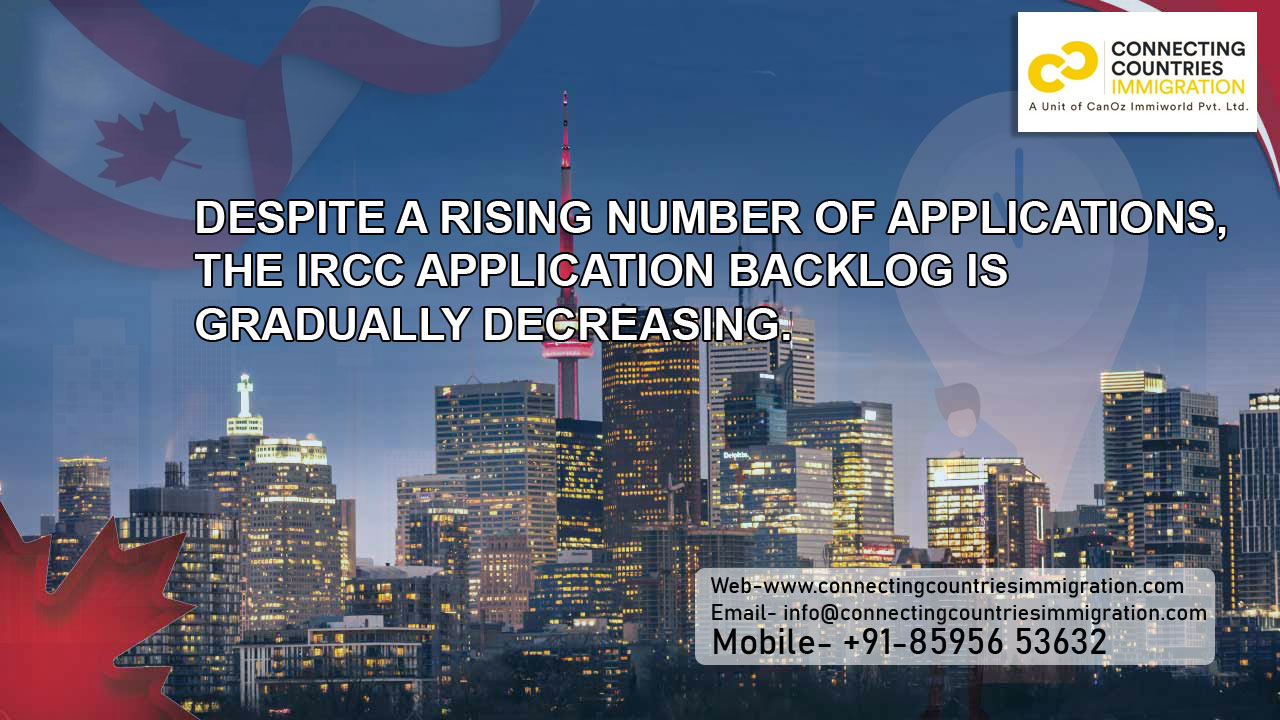According to the most recent Immigration, Refugees, and Citizenship Canada (IRCC) data, there is a backlog of 802,600 applications out of a total of 2,274,600 as of July 31.
The numbers show that the backlog is diminishing since the latest report on May 31. In May, 820,000 applications were considered backlogged out of a total of 2,248,000. This is significant since applications for study permits, employment permits, and temporary resident (visitor) visas often increase during the summer months.
Applications in inventory are those that have been submitted to the department but have not yet been finalized, according to IRCC. If an application is not processed and completed within service requirements, it is placed in the backlog.
Service standards are the average time it takes IRCC to process an application. It can differ based on the application. An Express Entry application for permanent residency, for example, should be processed within six months, whereas a study visa application should be processed within 60 days.
The IRCC’s goal is to process 80% of all applications within service standards while keeping the backlog at 20% or below.
In 2022, IRCC will have completed over 5.2 million applications across all business lines.
Permanent residence
According to the most recent data, IRCC has 631,500 permanent residence (PR) applications on file. 290,500 of these, or 46%, are deemed backlogged.
The total number of applications indicates that there are fewer PR applications in inventory than in May, when there were 640,000 applications. At the time, 48% had not been processed in accordance with service requirements.
IRCC breaks their PR application backlog forecasts into three categories.
The first category is for Federal High Skilled Workers, such as those in the Express Entry program. The IRCC estimated a 20% backlog for July 2023, while the backlog now stands at 16%. This is, however, slightly greater than the 15% backlog of PR applications observed in May 2023.
The backlog of Express Entry applications for candidates in the Provincial Nominee Program (PNP) has remained unchanged. As with the May 31 data, 30% of these applications are backlogged, which is 8% higher than expected and 10% higher than the aim of 20%.
The backlog of PR applications for wives, partners, and children is at 18%, which is lower than the predicted 24% and 2% lower than it was in May.
Citizenship
According to data on citizenship applications, 67,900, or 23%, of the 296,900 applications in inventory are in backlog. This represents a 4% decrease from May, when 27% of applications were considered backlogged.
The July figure is very identical to the IRCC’s prediction of a 24% backlog in citizenship applications. Throughout August and September, the backlog is predicted to rise to 26%.
Temporary residences
There are 902,000 applications for temporary residence visas and permits on file. This is a big decrease from the 1.3 million applications received in May.
Temporary residence applications, like permanent residence applications, are divided into three categories: Visas for study, work, and visitors
According to IRCC data, 47% of temporary residence visas (TRVs) were not processed within the 14-day service threshold at the end of July. This is a slight increase over the May data that showed 45% of visitor visas were not processed within service standards.
The backlog proportion for research permits has not changed between May and July. It remains at 17%, well below the aim of 20%.
In July, the backlog of work permit applications was 25%, somewhat lower than in May (27%), but higher than the predicted backlog of 22%.
Backlog reduction measures
According to IRCC, it has taken various steps this year to alleviate the backlog of temporary residency applications, including
· Launching an online portal that allows some permanent residence applicants to apply online
· Extending work permits for those with expiring post-graduate work permits,
· Increasing the length of stay for parents and grandparents in Canada on a Super Visa to five years with the option of a two-year extension,
· Expanding the student direct stream to include seven additional countries and
· Extending the eligibility of work permits to family members of temporary foreign workers.
CUAET
IRCC states that the Canada-Ukraine Authorization for Emergency Travel (CUAET) accounts for roughly 15% of temporary resident visa (visitor visa) applications and 71% of work permit applications in inventory.
Prior to the program’s closure on July 15, IRCC received 1,191,619 applications through CUAET. Under CUAET, applicants would apply for a TRV to enter Canada while also applying for a work permit.



